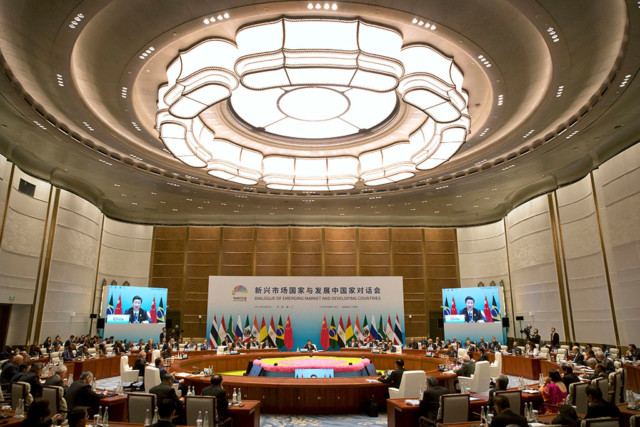BRICS leaders on Tuesday marked the end of their 2017 summit in Xiamen. It was the largest to date, and had several key differences compared to prior bloc gatherings.
CGTN’s Han Peng has been following the summit, and takes a look at what was accomplished.
A family photo of 10 world leaders capped this year’s BRICS summit. In addition to the founding members, the leaders of Egypt, Guinea, Mexico, Tajikistan, and Thailand joined in. This expanded group of countries is a model China hopes to make permanent.
“We are promoting a new approach called ‘BRICS Plus,’ in the hope of expanding the benefits of South-South cooperation from just five emerging economies to more developing countries,” Chinese President Xi Jinping said.
It’s still early to tell BRICS reached a consensus on this new approach, however, as some members fear it could dilute their influence in the bloc.Nonetheless, there was more common ground than difference.
The leaders of the five permanent member countries jointly issued the Xiamen Declaration. On the foreign policy side, they strongly condemned the Democratic People’s Republic of Korea’s latest nuclear test, which took place just before the summit began. They also called for reform at the United Nations, to better represent developing and emerging economies.
Additionally, they affirmed their strong opposition to trade protectionism.
“Protectionism is certainly a threat when people play selectively,” Kundapur Vaman Kamath, chief of the BRICS New Development Bank, said. “I think that’s what all of us ought to be careful on. Because opening up cannot be one sided. If you open up you have to be truly open. You cannot be selective.”
This year’s summit was also an opportunity for bilateral diplomacy. Indian Prime Minister Narendra Modi made a last minute announcement to attend the summit, amid concerns that the just ended military standoff China-India border could hurt trust between BRICS two largest members.
As for Indian business leaders, they’re focus remained on doing more business.
“You see big diversities in BRICS countries… but they should work together,” business executive Vidya Sagar Kaushik said.
 CGTN America
CGTN America Leaders attend the Dialogue of Emerging Market and Developing Countries on the sideline of the BRICS Summit in Xiamen in southeastern China’s Fujian Province, Tuesday, Sept. 5, 2017. Chinese President Xi Jinping warned that the world economy faces growing risks and uncertainties from countries turning inward on trade and resisting combating climate change, delivering an implicit rebuke to his American counterpart, Donald Trump. (AP Photo/Mark Schiefelbein, Pool)
Leaders attend the Dialogue of Emerging Market and Developing Countries on the sideline of the BRICS Summit in Xiamen in southeastern China’s Fujian Province, Tuesday, Sept. 5, 2017. Chinese President Xi Jinping warned that the world economy faces growing risks and uncertainties from countries turning inward on trade and resisting combating climate change, delivering an implicit rebuke to his American counterpart, Donald Trump. (AP Photo/Mark Schiefelbein, Pool)
